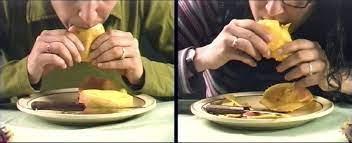Skye Thomas in The White Review:
 In the three-minute short MANGOES (1999) by Berlin-based Pakistani artist Bani Abidi, two women sit next to each other on a white table, each with a mango on a plate in front of them. Both women are played by Abidi. One character has her hair up in a bun, the other loose and flowing down her shoulders. One is Indian, the other Pakistani, both members of the diaspora of an unspecified country. They slice and pull open their respective mangoes, sucking the flesh clean off the skin. The fruit is an oblique symbol of their melancholy and wistful nationalism. As they eat, they speak about the mango-eating traditions of both nation states, but the conversation soon grows strained as they compete over which has more varieties of mango. It’s an arbitrary, quasi-comic tension, but perfectly representative of the sentiments of animosity and hostility that have ruled Indian and Pakistani relations for over seven decades since the Partition of the subcontinent in 1947. Much of Indian/Pakistani difference is mediated and maintained by trivial, and often untrue, distinctions. But it is the myth of this difference that reinforces the border and fuels its continuing clashes. Abidi uses the mango to disturb the border relation: while the Indo-Pak border is a physical site of military presence, surveillance and catastrophe, it is also something a bit more intangible, something conjured and retained in the imagination of those that inhabit it.
In the three-minute short MANGOES (1999) by Berlin-based Pakistani artist Bani Abidi, two women sit next to each other on a white table, each with a mango on a plate in front of them. Both women are played by Abidi. One character has her hair up in a bun, the other loose and flowing down her shoulders. One is Indian, the other Pakistani, both members of the diaspora of an unspecified country. They slice and pull open their respective mangoes, sucking the flesh clean off the skin. The fruit is an oblique symbol of their melancholy and wistful nationalism. As they eat, they speak about the mango-eating traditions of both nation states, but the conversation soon grows strained as they compete over which has more varieties of mango. It’s an arbitrary, quasi-comic tension, but perfectly representative of the sentiments of animosity and hostility that have ruled Indian and Pakistani relations for over seven decades since the Partition of the subcontinent in 1947. Much of Indian/Pakistani difference is mediated and maintained by trivial, and often untrue, distinctions. But it is the myth of this difference that reinforces the border and fuels its continuing clashes. Abidi uses the mango to disturb the border relation: while the Indo-Pak border is a physical site of military presence, surveillance and catastrophe, it is also something a bit more intangible, something conjured and retained in the imagination of those that inhabit it.
Abidi is interested in the ways that we – more specifically, those of us from previously colonised countries with violent histories – internalise the grand rhetorics of nationalism.
More here.
